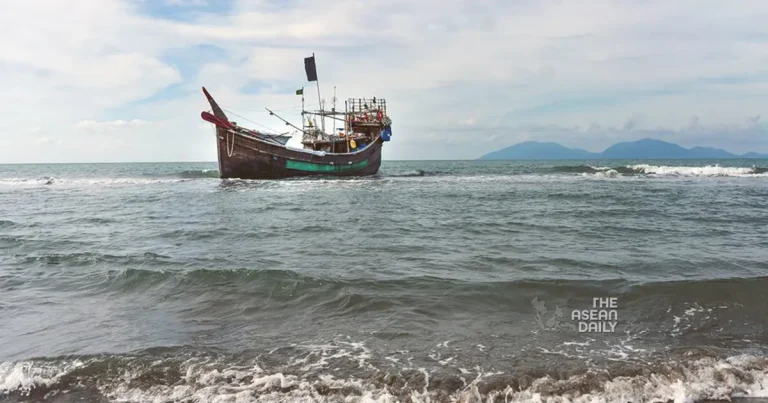1-1-2024 (JAKARTA) A group of approximately 170 individuals, believed to be Rohingya refugees from Myanmar, predominantly consisting of women and children who were hungry and weak, were discovered on a beach in Indonesia’s North Sumatra province after enduring weeks at sea. The refugees arrived on the shores of Kuala Besar, a fishing village located in the Langkat district, during the late hours of Saturday, according to Muhammad Amiruddin, the head of the village.
Upon witnessing the dire condition of the Rohingya Muslims, local villagers provided them with food and water while awaiting further instructions from immigration and local authorities in North Sumatra province. However, there was hesitation among residents residing near the beach regarding the presence of the refugees in their villages, as stated by Amiruddin. He remarked, “We assisted them as they appeared visibly weakened due to hunger and dehydration. Nevertheless, many residents are reluctant to accept them into our village, fearing that they might bring forth problems in the future.”
In a separate incident, a group of students attacked the basement of a community hall in Banda Aceh, the capital of Aceh province, where 137 Rohingya individuals had sought shelter. Human rights organizations and the United Nations refugee agency strongly condemned the attack, highlighting the severe shock and trauma experienced by the refugees. On Thursday, Indonesia’s navy revealed that they had forcefully repelled a boat carrying refugees back to international waters after it approached the shores of Aceh province a day earlier. It remains uncertain whether the refugees who arrived in neighboring North Sumatra province on Saturday were from the same boat that had been pushed away by the navy on Wednesday.
Due to a significant increase in Rohingya refugees departing from overcrowded camps in Bangladesh since November, Indonesia has reached out to the international community for assistance and heightened patrols in its waters. Over 1,500 Rohingya individuals have arrived in Aceh, but they have encountered hostility from fellow Muslims. It is important to note that Indonesia, along with Thailand and Malaysia, has not ratified the United Nations’ 1951 Refugee Convention and therefore is not legally obligated to accept Rohingya refugees. However, thus far, refugees in distress have been provided with temporary accommodation.
Muslims constitute nearly 90% of Indonesia’s population of 277 million people. Previously, Indonesia had tolerated such arrivals, while Thailand and Malaysia turned away refugee boats. However, there has been a surge in anti-Rohingya sentiment this year, particularly in Aceh, where residents accuse the Rohingya of engaging in inappropriate behavior and burdening the region.
The increasing animosity towards the Rohingya among certain Indonesians has placed pressure on President Joko Widodo’s government to take decisive action. Approximately 740,000 Rohingya fled their homes in Myanmar to escape a brutal counterinsurgency campaign by security forces and were subsequently resettled in Bangladesh. However, the conditions in the camps in Bangladesh are deplorable, with escalating gang violence and pervasive hunger, prompting many refugees to flee once again.




